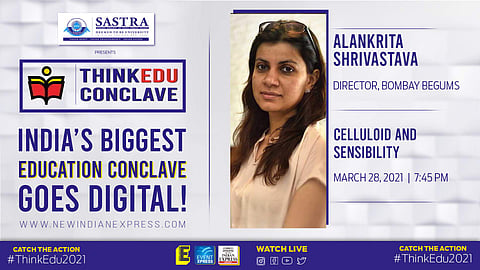

For Indian filmmakers, there's already self-censorship, a conscious level of censorship where you know which country you are in, what you can do, thus the mind doesn't go there at all — you know you can't cross certain political, social boundaries, said Alankrita Srivastava, Director of Netflix's new show Bombay Begums. "However, now with OTT platforms and streaming, there's a sense of opening up. Even 10 years ago I wouldn't have thought of working on something like Made in Heaven where the lead protagonist is gay and we are delving into his sexual life. To do that in a mainstream film, I would have thought about it a thousand times. But it's important to tell our stories as it is but we have to be more subversive. That's what I have realised. Humanity can't do without stories and we have to become more ingenious in saying what we want to. Now it's just about being a bit smarter," the director added while speaking at the New Indian Express' ThinkEdu Conclave 2021 on Sunday along with senior journalist and author Kaveree Bamzai. This year's ThinkEdu Conclave is being conducted online from March 26 to March 30, 2021.
Alankrita has earlier been well-known for showcasing remarkable women-centric stories and bold characters in Made in Heaven on Amazon Prime Video and the movie Lipstick Under My Burqa. Speaking on how she ensures her women characters are diverse, the director added, "I have always wanted to explore women from a different class, it was an instinctive thing I wanted to do. I wanted my work to look into women who don't have the same economic opportunities, wanted to explore how it is different for women who come from various economic backgrounds, harder to break off a lot of barriers in life. Wanted to get into that space- confined by economic condition and class where the woman will still try to break through. I have dealt with characters from different religions and it was not quite difficult as we all have had friends from a different faith when we were children. Caste is something I am learning about more right now, I am still in the process of educating myself more."
Responding to Kaveree on how her work has helped her overcome some inherent biases, Alankrita said that a lot of unlearning needs to be done. "I had this feeling of being trapped which is now getting undone. It is strange how women are happy with the leftover crumbs, that's how society has made us I believe. Through my work, I have gradually realised that I too can have my place. I am still at a place of feeling happy with very little, but it is getting better with time," she explained. Adding further to that point, Alankrita emphasises how showing women's sexuality on screen always had several biases and prejudices. "The heteronormative world is unrealistic, not very reflective of society. It is important to give space to characters who are queer, that kind of loosens up and having that kind of representation is extremely important. There are so many things to learn when you are exploring sexuality, it's interesting to see that journey, becomes intrinsic to the journey of the character and ties in with the graph of a character. We have a long way to go, nice to have a world in our stories to reflect more than straightjacket kind of characters," she said.
Speaking of male domination in cinema, Alankrita stated we are an ageist kind of society. "Our old male actors continue to work with female counterparts who are decades younger, they want to decrease their own screen age, they wish to keep looking younger, while a female actor is so quickly written off when they are old. I am glad things are changing now. Characters in their 40s, 50s are more interesting to me as they have lived a significant part of their lives, more mature. The characters they make will not be black and white, they know life is quite complicated," she added.
Finally, Alankrita's advice to young women is to not worry so much about talent. "Ask yourselves whether you have the emotional bandwidth to deal with ups and downs, particularly if you want to be a filmmaker — self-doubt, waiting, rejection is a part and parcel of everyday life. Do you have it in you to get up the next day and continue regardless of what happened the earlier day? Then go for it. You should have some sense of conviction in what you are doing, talent can be honed, it's just hard to stick it out," she concluded.
